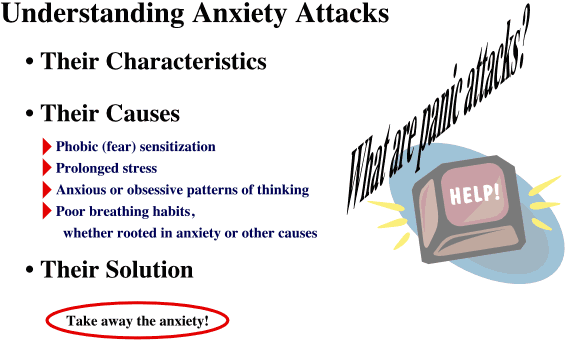Understanding Anxiety Attacks
Their Characteristics
|
What are the characteristics of anxiety attacks?
Maybe a long official description from "The American Psychiatric Association's Diagnostic and Statistical Manual of Mental Disorders, Fourth Edition (DSM-IV™)" will help.
The essential feature of a Panic Attack is a discrete period of intense fear or discomfort that is accompanied by at least 4 of 13 somatic or cognitive symptoms. The attack has a sudden onset and builds to a peak rapidly (usually in 10 minutes or less) and is often accompanied by a sense of imminent danger or impending doom and an urge to escape. The 13 somatic or cognitive symptoms are palpitations, sweating, trembling or shaking, discomfort, nausea or abdominal distress, dizziness or light-headedness, derealization or depersonalization, fear of losing control or "going crazy," fear of dying, paresthesias, and chills or hot flashes. Attacks that meet all other criteria but that have fewer than 4 somatic or cognitive symptoms are referred to as limited-symptom attacks.
|
 Some of us are not familiar with anxiety attacks. We might not have ever heard of them. This is understood. However, if we can learn how to deal with the most extreme cases, we cannot only help those in great distress but increase all our confidence in the love and power of God. If God can help people in the worse of circumstances then surely He can help me. Some of us are not familiar with anxiety attacks. We might not have ever heard of them. This is understood. However, if we can learn how to deal with the most extreme cases, we cannot only help those in great distress but increase all our confidence in the love and power of God. If God can help people in the worse of circumstances then surely He can help me.
Extreme worries are those that begin to affect your regular routine of life such as ones sleep, eating and other activities. Some individuals, for example, who are extremely worried about being in large groups avoid such situations. This worry not only induces physical problems like ulcers, upset stomachs, insomnia, headaches, fast breathing, etc., but also confusion, pressure, lack of ability to discern between what is real and what is false.
Like a nightmare one can begin to respond to unreal images as if they are real. You can tell these people the truth, but they do not accept it. They have been so preoccupied with their supposed troubles that they actually loose their sense of objectivity.
At some point these worries step over into the realm of fear. In simpler words, they are worrying over worry. Maybe I should say here that it is pointed out in books on extreme anxiety that it is hard to discover whether the physical problems affect the emotional or the emotional problems the physical. Jesus would look at physical, emotional and spiritual problems as signs or symptoms that something more foundational is wrong
Their Causes
What are the causes of these anxiety attacks?
One person reviewing the literature on anxiety attacks has listed these four causes.
- Phobic (fear) sensitization
- Prolonged stress
- Anxious or obsessive patterns of thinking
- Poor breathing habits, whether rooted in anxiety or other causes
We can't help but notice the words phobic (fear), anxious, anxiety and stress. They are not speaking of medical causes having to do with the regular but soul causes from the soul - fear (phobic) and anxiety. Of course these soul problems affect the physical as we have already mentioned, but the root causes goes back to the soul and the spiritual state of people.
Their Solutions
What are the solutions of these anxiety attacks?
This is what we want to discuss more fuller today. Firstly, let me remind you that doctors will try to deal with this issue as one of the body. They know its 'soul' causes but have no solutions for this. People still go to them to find relief so they prescribe medications that lessen some of the symptoms. These drugs often cause other serious secondary problems.
Secondly, before we go on, remember that what is true for the greater or more extreme worries, is true for dealing with little worries too. Jesus said, "Do not worry." The apostle Paul said, "Do not be anxious in anything." Our goal is not just to keep from having great bouts of anxiety but to completely eliminate all worries.
Let's examine our levels of trust are related to the degree of our worries. Next page
|
 Some of us are not familiar with anxiety attacks. We might not have ever heard of them. This is understood. However, if we can learn how to deal with the most extreme cases, we cannot only help those in great distress but increase all our confidence in the love and power of God. If God can help people in the worse of circumstances then surely He can help me.
Some of us are not familiar with anxiety attacks. We might not have ever heard of them. This is understood. However, if we can learn how to deal with the most extreme cases, we cannot only help those in great distress but increase all our confidence in the love and power of God. If God can help people in the worse of circumstances then surely He can help me.
